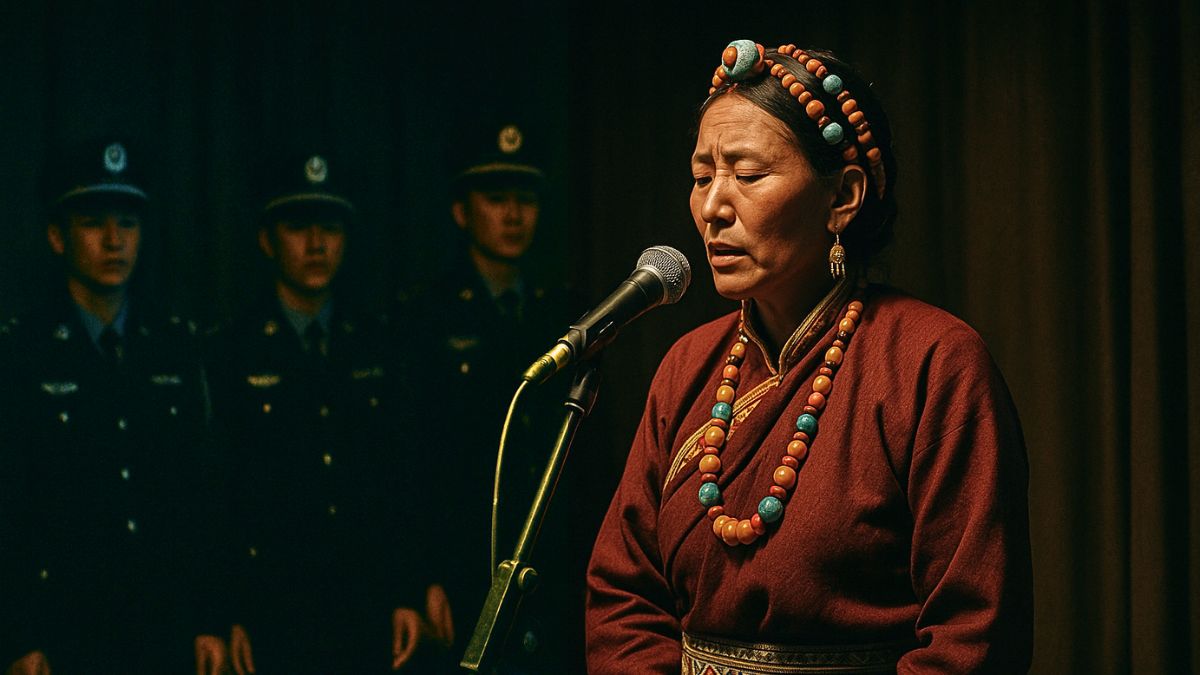China Is Putting Tibetan Artists, Writers On Trial In Courts, Making Tibetan Culture A Crime

Chinese authorities and courts look bent on criminalising Tibetan culture. Image courtesy: AI-generated picture via DALL-E
In Chinese courtrooms, Tibet’s culture is being put on trial. Over the past decade, a series of verdicts has targeted singers, writers, monks and activists whose only “offence” was to preserve their heritage. Official charges of “inciting separatism” and “endangering state security” have become legal weapons against cultural expression.
What emerges is not a handful of isolated cases, but a sustained campaign that blurs the line between security and suppression. For Tibetans, language, music and tradition are treated as evidence of disloyalty — their voices criminalised and their identities treated as a threat to the state.
How has China used its criminal law against Tibetan artists and writers?
Since 2008, dozens of cultural figures have been sentenced under Article 103 of China’s Criminal Law, which criminalises “inciting separatism”. The provision’s vague wording grants courts sweeping discretion, enabling punishments of up to life imprisonment even when no actual acts of violence or rebellion are alleged.
Human Rights Watch documented at least 51 Tibetans sentenced under China’s “anti-gang” campaign since 2018. In one month alone, 21 Tibetans in Nangchen County were convicted. In Qinghai, official figures revealed hundreds of arrests tied to this drive, many involving individuals whose main “crime” was speaking, writing, or singing in Tibetan.
Who have been the most prominent targets of this campaign?
The case of Tashi Wangchuk, a language rights advocate, is emblematic. After appearing in a New York Times documentary about his efforts to preserve Tibetan education, he was sentenced in 2018 to five years in prison. The court accused him of “distorting the facts” and “undermining ethnic unity” — citing the documentary’s international circulation as proof of harm to China’s “national image”. His defence lawyers raised allegations of torture and forced confessions, but these were dismissed without inquiry.
Musicians have faced similar persecution. Singer Lhundrub Drakpa was jailed for six years in 2020 for a song lamenting Tibetans’ suffering. In 2013, two young musicians, Pema Trinley and Chakdor, were sentenced to four years each for an album praising the Dalai Lama and referencing self-immolation protests. Two of their collaborators simply disappeared. Even older cases, such as environmental activist Karma Samdrup, who was handed a 15-year sentence in 2010 for long-dropped charges, reveal the arbitrary reach of state prosecution.
What patterns show systematic repression?
Trials are often secret, without proper legal representation, and verdicts are scrubbed from official databases to erase the record. The Tibetan Centre for Human Rights and Democracy confirmed that cases tied to “state security” are being deliberately removed, leaving defendants without access to their own judgements. The disappearance of such files makes accountability nearly impossible.
The state’s definition of threat extends to every corner of cultural life: literature, song, and even everyday advocacy for language rights. UN human rights experts and the European Union have condemned the criminalisation of cultural expression, yet prosecutions persist. Chinese authorities treat international media attention itself as evidence of guilt — a sign of how tightly Tibet’s cultural survival is bound to questions of state legitimacy.
Why does this matter beyond Tibet?
This campaign is not an aberration but a deliberate strategy. By conflating cultural expression with separatism, Beijing has normalised repression as a legal act. The result is a society where Tibetan culture is equated with disloyalty, and where artists become prisoners for their words, songs and teachings.
For Tibetans, this means that the very things that define them — language, heritage, spirituality — are criminalised in court. For the world, it exposes how cultural identity can be dismantled not only through censorship but also through the machinery of law.







